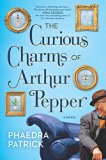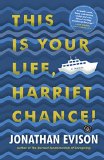Summary | Excerpt | Reviews | Beyond the book | Read-Alikes | Genres & Themes | Author Bio

Aaron Englund is an ESL teacher who has just left his long-term partner to move from Albuquerque to San Francisco. He spent nearly half his life with Walter, a college professor 15 years his senior, so moving on is both scary and exciting. It's a chance to put together a new life, yet Aaron cannot escape the past. As he moves into a converted garage apartment and settles into teaching at a sketchy language school, Aaron keeps having persistent flashbacks to the year when he was five years old and his family life changed forever.
Aaron grew up in Minnesota with a policeman for a father. His mother, Dolores, intended to take Aaron and escape her husband's verbal and physical abuse. This was before the parade, though. After the parade, as the title makes clear, everything was different. Interspersed with the present narrative are sections revisiting Aaron's youth, so that we gradually learn about the struggle of those early years. Chiefly, Aaron spent some time living with fundamentalist relatives while Dolores was in a mental hospital, and then together they took over running a small-town café.
In the present day, Aaron learns as much from his students as they do from him. Their immigrant idealism is fading as they discover that "in America, you [are] free, free to be lonely." They help Aaron see that we too often focus on stigmas and differences instead of accepting each other. Meanwhile, little things like body language can lead to misunderstandings for native speakers just as they can for novices. The most touching case is Melvin's: a Korean software designer, he has a facial deformity and a Bulgarian fiancée he can only communicate with via online translators. He also has a secret only Aaron knows.
Indeed, in addition to his own traumatic past, which he is reluctant to deal with, Aaron is a repository for other people's sad stories, starting with a family friend he met as a child. Dolores' old friend Gloria had a brother named Clarence who was confined to a wheelchair. Not only was he a dwarf, he also had facial deformities. He and Aaron struck up an odd friendship, and Clarence told him something that rang true over the years: "I have found that there is no better way to forget your own tales of woe than by listening to those of others."
What we get here, then, is many tales of woe. Aaron and his mother's, yes, but also those of Bernice, their obese café employee; a little boy he encounters at a motel; and so on. Through these stories, Aaron starts to deal with some of his repressed emotions. "Lately, it's like I've reverted to childhood, when everything made me cry, yet I feel strangely removed from emotion also," he confesses. When Aaron later takes advantage of a chance to dig into his history, he comes to feel that "maybe clarity is sometimes about knowing what you don't need to know."
Although it is set over one six-month period, the novel is so full of flashbacks that it feels dense with the weight of the past. We never get closure on some of the stories which, though slightly frustrating, is true to how life works: people enter and exit it at random, and we often don't learn the effect we've had on others until years later, if at all.
At times the novel can feel like a set of short stories, only loosely connected through the character of Aaron. Ostlund won a Flannery O'Connor Award (see 'Beyond the Book') for a previous short story collection, and you can understand why: she creates unforgettable scenes and characters, each one with a fully realized backstory. I wasn't sure that she quite brought them all together as a novel, though: Aaron himself is not as vivid as some of the secondary characters, especially Clarence, and I never understood exactly why Aaron left Walter.
Still, the overarching theme of the novel is strong and resonant: "after the parade," after everything has changed irrevocably, you must keep going, pushing past loneliness and trauma to build a new life. Ostlund's debut novel has a big heart and a deep understanding of the gamut of human emotions. I'll be reading her short story collection soon, and then looking forward to her next novel.
![]() This review was originally published in The BookBrowse Review in October 2015, and has been updated for the
August 2016 edition.
Click here to go to this issue.
This review was originally published in The BookBrowse Review in October 2015, and has been updated for the
August 2016 edition.
Click here to go to this issue.

If you liked After the Parade, try these:

The Curious Charms of Arthur Pepper
by Phaedra Patrick
Published 2017
In this poignant and sparkling debut, a lovable widower embarks on a life-changing adventure

This Is Your Life, Harriet Chance!
by Jonathan Evison
Published 2016
Part dysfunctional love story, part poignant exploration of the mother/daughter relationship, Jonathan Evison has crafted a bighearted novel with an endearing heroine at its center.
Your guide toexceptional books
BookBrowse seeks out and recommends the best in contemporary fiction and nonfiction—books that not only engage and entertain but also deepen our understanding of ourselves and the world around us.